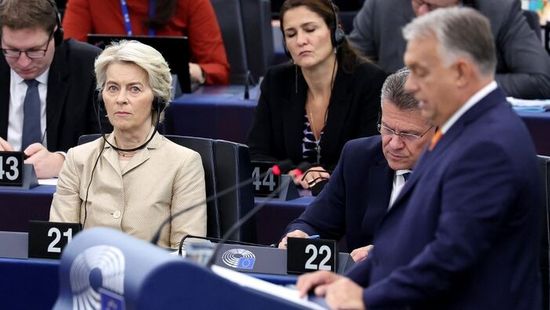Dokumentumok bizonyítják: Brüsszelben arra készülnek, hogy a Fidesz nyeri meg a választást

Az elemző szerint ráadásul az is egyértelmű, miért nem lenne rájuk szükség, ha Magyar Péteréket tartanák esélyesnek.

There is no such thing as real Communism without massacre, torture, concentration camps, gulags, or laogai.
„The four surviving leaders of Cambodia’s Khmer Rouge regime, including the former head of state, Khieu Samphan, have been imprisoned in Phnom Penh since 2007 and will be brought to justice in their own country. On September 16, a United Nations-backed Cambodian tribunal indicted them for genocide, crimes against humanity, and other crimes. The tribunal has already established its credibility with its first trial: this past July 26, it sentenced Kaing Guek Eav (better known as Duch), a cog in the Khmer Rouge’s extermination machine, to 35 years in prison. Duch ran a torture center from 1975 to 1979 that produced 15,000 victims. Unlike the Nuremberg tribunal that judged Nazi leaders in 1945, the Phnom Penh tribunal is not run by the victorious powers; it functions within the Cambodian justice system, sustained by Cambodian public opinion, though the U.N. provides financing. The tribunal’s legitimacy and objectivity are beyond reproach. Still, the Cambodian public did not see Duch’s sentence as sufficient in view of his crimes. The defendant apparently persuaded the court that he was obeying his superior’s orders—the same excuse Nazi leaders made at Nuremberg.
In the Western and Asian press, as well as in statements by various governments, a distinct effort has been made to reduce the crimes of Duch and of Khieu Samphan to matters of local circumstance. It is as if an unfortunate catastrophe had fallen on Cambodia in 1975 called the Khmer Rouge, killing 1.5 million Khmers. But who or what was behind what the tribunal has called the genocide of Khmers by other Khmers? Might this be the fault of the United States? Was it not the Americans who, by setting up a regime in Cambodia to their liking, brought about a nationalist reaction? Or, might this genocide not be a cultural legacy, distinctive of Khmer civilization? Archeologists are digging through the past in vain to find a historical precedent. The true explanation, the meaning of the crime, can be found in the declarations of the Khmer Rouge themselves: just as Hitler described his crimes in advance, Pol Pot (who died in 1998) had explained early on that he would destroy his people, so as to create a new one. Pol Pot called himself a Communist; he became one in the 1960s as a student in Paris, then a cradle of Marxism. Since Pol Pot and leaders of the regime that he forced on his people referred to themselves as Communists—and in no way claimed to be heirs of some Cambodian dynasty—we must acknowledge that they were, in fact, Communists.”